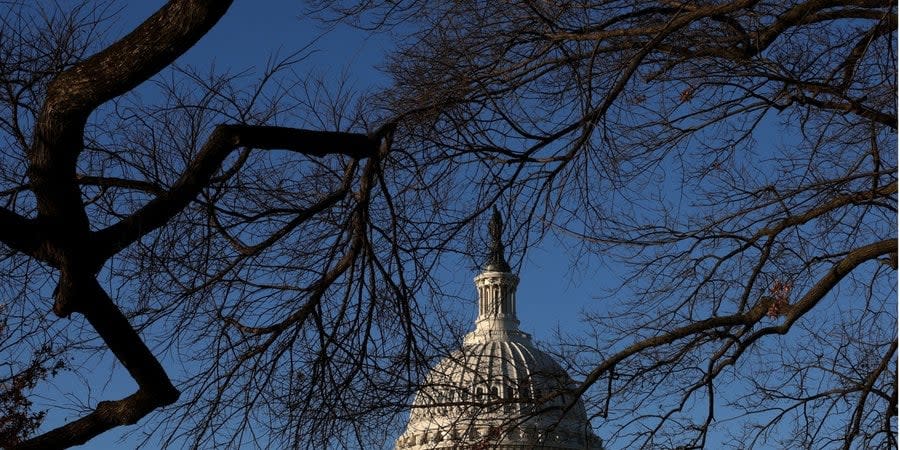Top House Republicans consider separate Ukraine aid bill

House Speaker Mike Johnson and the chairmen of key House committees dealing with national security are working to develop their own Ukraine aid package that would treat non-military aid as a “loan,” NBC News reported on March 9.
They hope it can pass Congress without alienating conservatives who oppose further funding for the war-torn country.
The plans are in their preliminary stages and far from fully formed, but Republicans who support Ukraine want to be prepared to tackle the legislation as soon as Congress clears another government shutdown deadline on March 22. Waiting any longer could push passage of critical aid for Kyiv into April, given a planned two-week Congressional recess at the end of March, NBC sources said.
Among the proposals being floated is treating some non-military aid as a type of loan, said House Foreign Affairs Chairman Mike McCaul, who is involved in the discussions, and Sen. Lindsey Graham. Economic aid to support the general function of Ukraine’s government and its long-term rebuilding efforts would be subject to a loan under this plan.
Read also: U.S. House may finally consider Ukrainian aid package in late March or April
Russian assets seized by the U.S. government through sanctions could also be used as collateral for loans to the Ukrainians, McCaul said, adding that the plan could also have a generous repayment system to help Kyiv.
Offering up loans as part of the package is designed to help ease the concerns of House conservatives who have criticized billions in U.S. aid for Ukraine and said they will not support sending further U.S. taxpayer dollars without a long-term plan to win the war.
McCaul said the proposal would make Russia at least partially responsible for paying for Ukraine to rebuild.
“We’re looking at two factors. One is my REPO Act, which will allow us to attach assets related to the Russian sovereign assets that have been sanctioned to help pay for Russia’s war crimes. That’s a very popular idea in the House,” he said.
“And secondly, the loan program. … At the end of the day, the Russian sovereign assets would pay for that or they would just default.”
On Feb. 20, White House National Security Advisor Jake Sullivan said the White House does not think aid to Ukraine in the form of a loan, as former President Donald Trump suggested, would be “the best way forward.”
“Asking Ukraine to take on and shoulder a substantial amount of debt right now, as it's fighting for its life, we don't regard that as the best way forward,” he said.
“Talking about loans as opposed to providing the necessary infusion of cash is only going to make the economic problems of that country worse,” he said, adding that a stable Ukraine “is in the fundamental national security interest of the United States.”
A U.S. official familiar with White House’s position told NBC News on March 8 that some “aid is better than no aid, but this is not an ideal way of doing it. ... Asking a country to take on tens of millions of dollars of debt that they can’t afford to pay off is a recipe for a significant burden, will hurt Ukraine long term and could lead to economic crises down the road.”
McCaul is insistent that work on a new Ukraine aid package begin soon, suggesting the House would write its own bill and send that back to the Senate.
Read also: US Congressman Fitzpatrick on options and scenarios to advance $61 billion Ukraine aid bill vote
“This is urgent in Ukraine. We can’t waste any more time,” he said.
If the House punts the foreign aid bill to April, Republicans will have rounded the corner on several key primaries, which could free up additional GOP support for funding to Ukraine, said two officials with knowledge of discussions.
The U.S. Congress has been unable to pass a bill to fund aid to Ukraine, Israel, and Taiwan for more than three months. Republicans have been blocking the vote, demanding stricter migration policies and stronger border protection with Mexico.
American media reported in January that Republicans were being influenced by former President Donald Trump, who was demanding that the party reject the compromise deal on immigration.
The U.S. Senate passed the bill providing $95 billion in aid to Ukraine, Israel, and Taiwan, $60 billion of which is earmarked for Kyiv on Feb. 13. The same day, House Speaker Johnson once again criticized the Senate proposal, stating that he was not going to introduce the bill supported by the Senate for consideration.
The U.S. House of Representatives adjourned for recess on Feb. 15 without passing the aid bill for Ukraine. Now this issue will be considered no earlier than mid-March.
After a meeting with U.S. President Joe Biden at the White House on Feb. 28, Mike Johnson said that he would put the extension of aid to Ukraine to a vote in a “timely manner.” During a meeting with leaders of both parties in Congress, Biden emphasized the “urgent need” to provide aid to Ukraine.
The speakers of 23 parliaments and the head of the European Parliament, Roberta Metsola, called on Johnson to bring the bill to the floor on Feb. 28. The next day, the speaker said that the House of Representatives would not consider the issue of allocating aid to Ukraine before the U.S. government receives funding.
We’re bringing the voice of Ukraine to the world. Support us with a one-time donation, or become a Patron!
Read the original article on The New Voice of Ukraine

